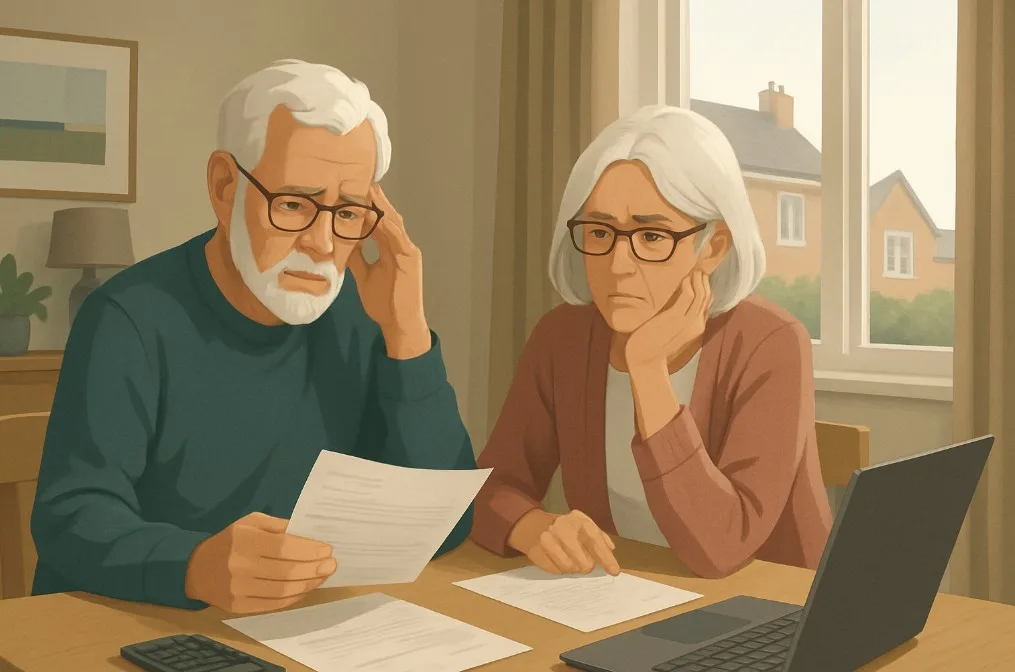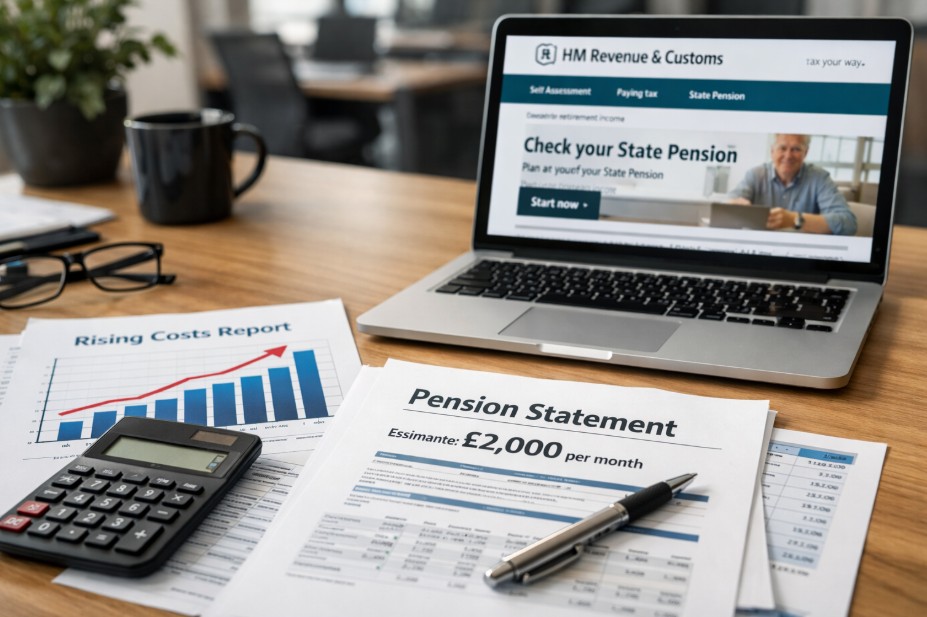Table of Contents
ToggleWhy Are Pensioners Concerned About Rachel Reeves’ Tax Policies?
How will Rachel Reeves, the UK’s first female Chancellor of the Exchequer, balance the nation’s books without breaking Labour’s promises to working people? With a budget deficit of around £20 billion and markets already worried about the sustainability of Britain’s £2.9 trillion national debt, the question of who pays for economic stability is unavoidable. For pensioners, the stakes are particularly high.
Retirees have already endured years of financial pressure: frozen tax thresholds, high energy bills, rising food costs, and increasing healthcare expenses. Many live on fixed incomes, making them vulnerable to any shift in government policy.
When influential think tanks close to Labour suggest that Reeves should look to pensioners as part of a £6 billion tax-raising plan, concerns grow that older people could once again bear a disproportionate share of the burden.
Why Has the Resolution Foundation Suggested Raising £6bn from Pensioners?

The Resolution Foundation, a think tank often described as the “intellectual engine” of Labour’s economic strategy, has called on Reeves to reconfigure the tax system by reducing National Insurance contributions for employees while increasing income tax.
The proposal involves cutting employee National Insurance by 2p in the pound and adding that amount to income tax.
For workers, this would largely be a neutral adjustment. Their National Insurance bills would fall, but they would pay more in income tax. For pensioners, landlords and the self-employed, the impact would be different.
Pensioners do not pay National Insurance, so they would face only the income tax rise. According to estimates, this would affect about 8.7 million pensioners already paying income tax and around 4.3 million self-employed people.
The Foundation argues that such a move would raise about £6 billion annually and spread the burden more evenly across society while protecting “working people” from further tax hikes.
In their view, this form of rebalancing is fairer because it includes those who currently contribute less under the National Insurance system.
How Strong Are the Resolution Foundation’s Links to the Labour Government?
The Resolution Foundation is not merely an outside voice; it has deep ties to the Treasury and other parts of government.
Several senior figures within Labour’s economic team are former staff members of the think tank. Torsten Bell, once its chief executive, is now a minister with responsibilities spanning welfare and fiscal policy.
Dan Tomlinson, the Exchequer Secretary to the Treasury, also came through the Foundation. Richard Hughes, another former associate, now heads the Office for Budget Responsibility, the independent body that monitors government finances.
These connections make the Foundation’s recommendations highly influential. In fact, Reeves has already adopted previous proposals from the think tank, such as applying inheritance tax to unused pension pots and restricting relief for certain family businesses. This history suggests that ideas floated by the Resolution Foundation often foreshadow official Labour policy.
What Would the National Insurance to Income Tax Shift Mean in Practice?

At first glance, the proposal looks technical. Yet for pensioners, its implications could be significant. Since retirees do not pay National Insurance, adding part of that contribution to income tax would directly increase their bills.
Consider a pensioner with a combined state and private pension income of £15,000 per year. Under the current system, this individual pays tax only on the portion above the £12,570 personal allowance.
If income tax rates were adjusted upward to replace National Insurance, their liability could increase by hundreds of pounds annually.
For someone with additional rental income, the effect would be sharper. A retired landlord earning £20,000 per year in pension and property income might see their tax bill rise by several hundred pounds under the proposed shift. Although employees would experience little net change, pensioners and others outside the workforce would shoulder the added burden.
This approach raises questions of fairness. Supporters argue it ensures that all groups contribute to public finances. Critics counter that it risks unfairly targeting people who have already left the workforce and often live on modest, fixed incomes.
Why Is the Personal Allowance Freeze Still a Stealth Tax on Retirees?
Even without the proposed tax shift, pensioners are already affected by the government’s decision to freeze income tax thresholds until 2028. The personal allowance, set at £12,570, has not risen with inflation. At the same time, the state pension increases annually under the “triple lock”, which ensures it rises by the highest of inflation, earnings growth, or 2.5%.
By 2025, the full new state pension will reach approximately £12,536, just below the personal allowance. This means that pensioners with even a small occupational pension or modest savings income will exceed the threshold and begin paying tax.
For example, someone receiving the state pension plus £500 annually from savings will pay tax on that income, despite it barely covering rising costs of essentials.
This dynamic, known as fiscal drag, pulls more retirees into the tax net each year. It represents an invisible tax rise, not through an increase in rates but by allowing inflation to do the work. Combined with the potential changes recommended by the Resolution Foundation, many retirees fear they could face a double blow.
What Other Tax Increases Are Being Considered?
The Resolution Foundation’s recommendations are not limited to pensioners. To restore stability to the public finances, the think tank has proposed a broader package of revenue-raising measures estimated to bring in more than £30 billion annually.
These include reducing tax reliefs for farmers and family businesses, increasing taxes on highly paid professionals such as partners in limited liability partnerships, and raising levies on sugar, salt, flights, shipping, and even electric vehicles.
The goal, according to the Foundation, is to diversify the tax base and ensure sustainability in the face of rising borrowing costs. However, industry bodies such as the British Retail Consortium have warned that some of these measures, particularly those affecting retail and food production, could feed into higher prices for consumers.
For pensioners, who spend a large proportion of their income on necessities, such knock-on effects could compound the pressure of higher direct taxation.
Why Has the Proposal Met Opposition?

The suggested tax reforms have not gone unchallenged. Baroness Ros Altmann, a former pensions minister, has argued that targeting pensioners risks fuelling intergenerational resentment.
She has described the idea of pensioners receiving an unfair advantage over workers as “dangerous” and misleading. In her view, many retirees already contribute significantly and cannot easily increase their incomes to offset new taxes.
Business groups have also raised alarms. The British Retail Consortium warned that higher levies on shops and supply chains could push food inflation higher, making life harder for households. Political opponents, including the Conservatives, have framed the proposals as evidence of Labour’s so-called “tax-and-spend doom loop”, claiming it will make families poorer while discouraging growth.
This pushback highlights the political tightrope Reeves must walk. On one hand, she needs to reassure markets that Britain’s finances are sustainable. On the other, she must avoid breaking Labour’s electoral promises or alienating large groups of voters, including retirees.
How Might Pensioners Cope with Higher Tax Liabilities?
If Reeves follows the Resolution Foundation’s advice, pensioners could see their disposable incomes shrink. Yet there are strategies to reduce the impact. Retirees may benefit from making full use of allowances such as the Marriage Allowance or Blind Person’s Allowance.
Income from ISAs remains tax-free, so shifting savings into these vehicles can protect returns. Those with private pensions can also plan withdrawals carefully to stay below higher thresholds.
Professional advice can be valuable, particularly for those with multiple income sources. Financial planners can help pensioners balance withdrawals, savings, and investments in ways that minimise tax liability. While not all retirees will be in a position to make major adjustments, proactive planning can ease the strain.
How Does Pensioner Taxation Compare Under Current and Proposed Systems?
To understand the impact more clearly, it helps to compare scenarios under the existing system and one in which Reeves adopts the Resolution Foundation’s recommendations.
| Pensioner Income (Annual) | Current Tax Liability | With NI-to-Income Tax Shift | Likely Impact |
| £12,500 (state pension only) | No tax due | No tax due | No change |
| £13,000 (state + small private pension) | About £86 annually | About £150 annually | Higher bill |
| £20,000 (state + rental income) | About £1,486 annually | About £1,800 annually | Noticeable rise |
| £30,000 (mixed pensions + savings) | About £3,486 annually | About £3,800 annually | Significant increase |
This table illustrates how even modest pensioners could pay more, while wealthier retirees with additional income sources would face larger increases.
What Does the Future Hold for Pensioners Under Reeves’ Tax Plans?
Rachel Reeves faces one of the most difficult fiscal challenges in decades. Her priority is to restore confidence in Britain’s finances, prevent borrowing costs from spiralling, and fund Labour’s commitments without destabilising the economy. Pensioners, however, remain wary.
The combination of a frozen personal allowance, rising state pensions, and potential income tax increases could make them some of the biggest contributors to Reeves’ revenue-raising strategy.
Whether Reeves proceeds with the Resolution Foundation’s advice will become clearer in the autumn Budget. For now, pensioners can only prepare by staying informed, reviewing their finances, and considering professional guidance. The debate also raises broader questions about fairness, intergenerational balance, and how to fund public services in an ageing society.
Frequently Asked Questions
Will Rachel Reeves introduce a specific pensioners tax?
There is no new tax designed solely for pensioners. However, proposals to shift National Insurance into income tax would disproportionately affect retirees.
How many pensioners already pay income tax?
Around 8.7 million people above state pension age are taxpayers, a number that is expected to rise further due to the frozen personal allowance and rising state pension.
What is fiscal drag?
Fiscal drag occurs when thresholds for tax remain frozen, but incomes rise with inflation, pulling more people into paying tax. Pensioners are especially vulnerable to this effect.
Would workers be affected by the proposed tax shift?
For most employees, the changes would be neutral. Their National Insurance contributions would fall, while their income tax would rise by roughly the same amount.
Why is the Resolution Foundation influential in this debate?
The think tank has strong ties to the Treasury and Labour government, with several of its former staff now holding senior positions in policymaking.
How can pensioners reduce their tax burden?
They can make use of allowances, invest in ISAs, and manage pension withdrawals carefully. Professional financial advice can also help to minimise liabilities.
Could other tax changes increase the pressure on pensioners indirectly?
Yes. Proposals to raise taxes on food, retail, and energy-related industries could push prices higher, indirectly adding to pensioners’ financial burdens.




